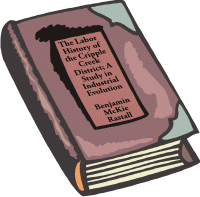 |
Victor
|
The Labor History of the Cripple Creek District;
A Study in Industrial Evolution
by Benjamin McKie Rastall

pages 141-143
The Mine Owners' Association—Its Side Of The Case
Most of the principal mine owners of the Cripple Creek District acted in concert during the strike of 1894, and came to be spoken of collectively as the Mine Owners' Association. While there was no formal organization, the name persisted during the period between the two strikes. At the opening of the difficulties of 1903-4 the mine owners continued to act collectively. On August 13, 1903, a statement was issued over the signatures of thirty mine owners setting forth the generally satisfactory conditions preceding the strike, and declaring a policy of vigorous opposition to the Federation.13 Soon after, steps were taken to give the organization a permanent form. The Cripple Creek Mine Owners' and Operators' Association was formally organized. E. A. Colburn was elected president, W. H. Bainbridge treasurer, and C. C. Hamlin secretary.14 The association acted thereafter as a body through the regular channels of president, secretary, and treasurer.
On September 17th the following notice was posted:
"It is hereby given out that no member of any union, affiliated or connected with the Western Federation of Miners will be given employment on this property.
"By order of the Cripple Creek District Mine Owners' and Operators' Association."
The association thereafter announced its intention not only to refuse absolutely to treat in any way with the Western Federation of Miners, or employ its members, but to prevent if possible the employment of Federation men anywhere in the district. So far as the influence of the organization would reach, mines and mills operating at the time were compelled to discharge all union workmen.15
March 10, 1904, after the first period of military rule, the association went a step further, and announced its intention "to drive the disturbing and dangerous element of the Western Federation of Miners from the district and from the state if possible."16 This was followed by the adoption of the card system, which effectually blacklisted members of the Federation. All applicants for work were furnished with a blank form for the answering of a number of questions, the last four of which were as follows:
"Are you a member of the Western Federation of Miners?
''Have you ever been a member of the Western Federation of Miners ?
"If so, when did you sever your connection with that organization?
"Do you belong to any labor organization, and if so, what?"
These questions satisfactorily answered, the secretary of the association issued the applicant a card, which was surrendered and returned to the secretary upon securing employment. When a new position was sought the card was re-issued. No work could be obtained without it, and a man could be dropped at any time by simply refusing to re-issue his card.
To the mine owners the Cripple Creek strike was simply an unwarranted, arbitrary, and unjust blow, struck at the instigation of a few officials while conditions were unusually satisfactory, and in spite of the actual opposition of the men concerned.17 Whatever may have been the status of the eight-hour day in Colorado City it was not involved at Cripple Creek, for the eight-hour day had been in force there for nine years. Whatever may have been the conditions at Colorado City the mine owners were not concerned. Only a few of the mines were shipping to the mill in question, and most of them were bound absolutely by contracts. It was unthinkable that they should be forced into being the club of the Western Federation for the compelling of anybody and everybody to the wishes of that organization.
The strike called, and no demands to which to accede, no grievances to settle, but one course was possible, to open the mines fearlessly, and run them in independence of the Federation. It was not to be supposed that in the future they would put themselves again under the power of such an organization, Federation men might look elsewhere for employment. When resort was had to threats and actual violence, and they were being prevented from opening the mines, it was no more than right that the state should furnish them protection, especially when the local government was so largely in the hands of their opponents, and no very active efforts were to be expected from them. The card system was to give them a record of their workmen, and to prevent the union miners from quietly getting back into power.
With the explosion and riots of June 6th, it became apparent that no permanent peace could be expected so long as the organization of the Western Federation remained in the county. Under the conditions it was almost impossible to ferret out criminals, and as the mines were successfully operating, and it was not proposed to have any further dealings with the Federation, the only thing left was to rid the community of it. This was a humane and just policy, for angry citizens were threatening general lynchings. Deportation was an act of necessity for the general welfare of the public.18
13Given in full, p. 92, f. n. 12.
14Accounts by officers.
15Labor Disturbances in Colorado, in Report of the United States Commissioner of Labor, p. 224. Also this work, p. 117, f. n. 23.
16Given in part on pp. 116 and 117.
17Digest from proclamations, and statements by officers.
18Ibid.
NEXT: History of the alliances — Sympathetic view of their position